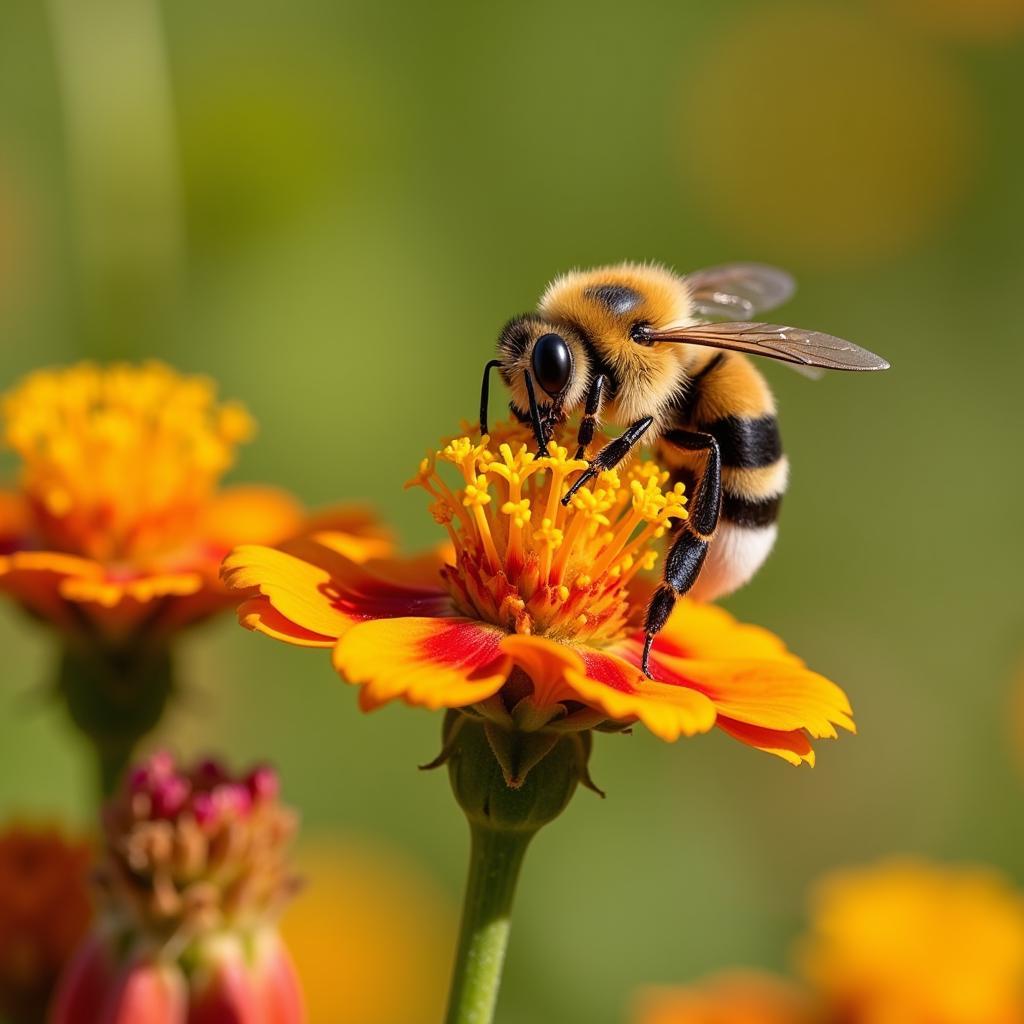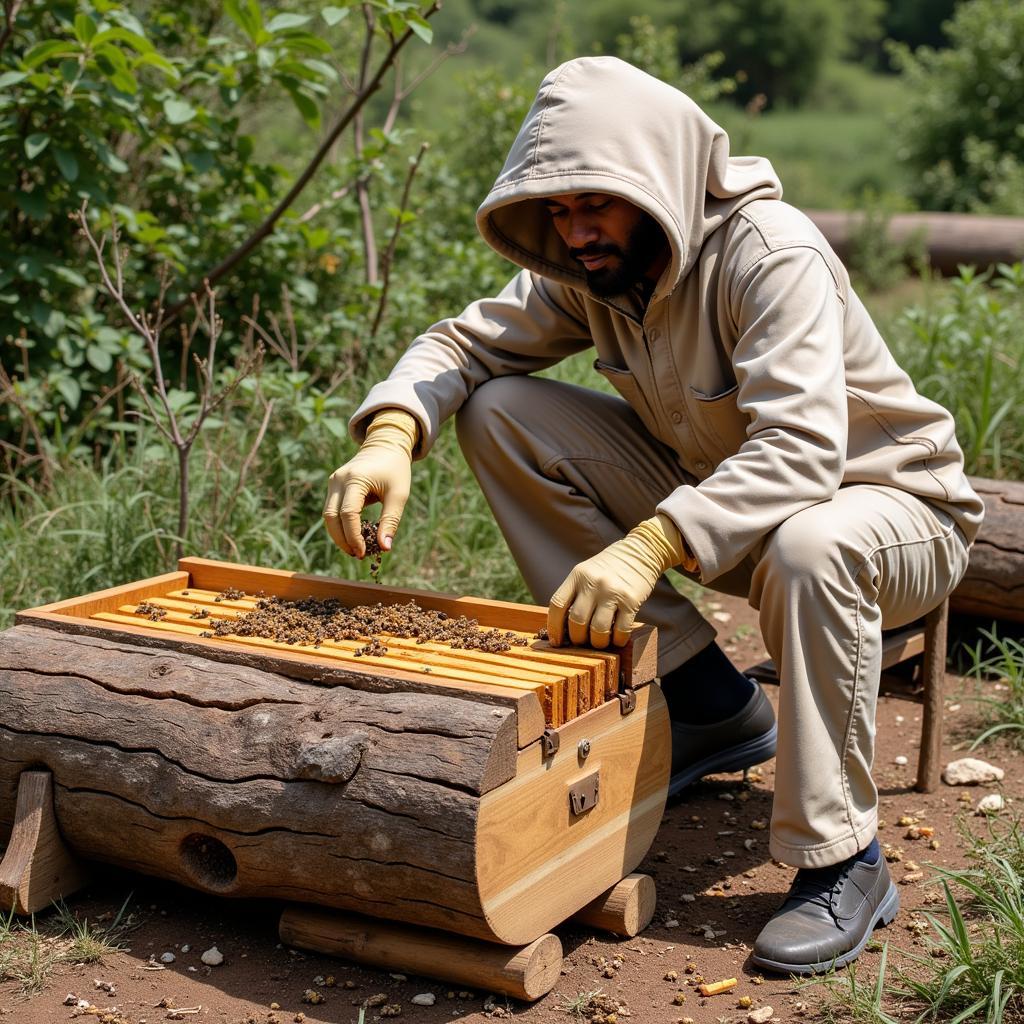Exploring the Diverse World of African Bee Species
African Bee Species are a fascinating and vital part of the continent’s diverse ecosystems. From the well-known Africanized honeybee to lesser-known stingless varieties, these insects play a crucial role in pollination and honey production, contributing significantly to both biodiversity and local economies. Understanding their diverse characteristics, behaviors, and the challenges they face is essential for conservation efforts and sustainable beekeeping practices across Africa.
The Buzz About African Honeybees: Characteristics and Behaviors
African honeybees are renowned for their resilience and adaptability to harsh environments. Their smaller size and aggressive defensive behavior set them apart from European honeybees. They are prolific honey producers, foraging over wider areas and exhibiting a greater tolerance for extreme temperatures. While their defensive nature can pose challenges for beekeepers, it also provides them with an effective defense against predators and parasites. This allows them to thrive in diverse habitats across the continent. For example, in the dry savannas, they play a crucial role in pollinating acacia trees. After the first few paragraphs, we can see how valuable these bees are to the ecosystem. Do you know much about African medicinal plants? You might be surprised by the biodiversity. Check out this interesting article about the African journal of medicinal plant.
The Stingless Wonders: A Look at Meliponines
Beyond the well-known African honeybee, the continent boasts a remarkable diversity of stingless bees, belonging to the Meliponini tribe. These bees, often overlooked, play a vital role in pollinating indigenous plants. Unlike their stinging counterparts, stingless bees rely on resin and other plant materials to build their nests and defend their colonies. Their honey, often described as having a tangy or slightly sour flavor, is highly valued in some communities for its medicinal properties.
African Bee Species and their Importance to the Ecosystem
African bee species are essential pollinators for a vast array of plants, contributing significantly to the continent’s rich biodiversity. From wildflowers to vital crops, these busy insects facilitate plant reproduction and ensure the survival of numerous plant species. Their pollination activities have a direct impact on food security and the livelihoods of many communities. Furthermore, their role in maintaining the health and balance of diverse ecosystems is crucial for overall environmental stability.
The Threat of Habitat Loss and Climate Change
Like many other pollinators worldwide, African bee species face growing threats from habitat loss and climate change. Deforestation, agricultural expansion, and the use of pesticides contribute to the decline of bee populations. The changing climate patterns, including increased temperatures and altered rainfall patterns, further exacerbate these challenges. Protecting these vital insects requires a concerted effort to conserve their natural habitats and implement sustainable agricultural practices. For those intrigued by African wildlife, here’s an interesting article about the African birds list.
 African Bee on Wildflower
African Bee on Wildflower
Beekeeping Practices in Africa: A Rich Tradition
Beekeeping has a long and rich tradition in many African communities. From traditional log hives to modern beekeeping techniques, people across the continent have developed unique methods for harvesting honey and beeswax. These practices often incorporate indigenous knowledge and sustainable resource management, reflecting a deep understanding of the delicate balance between humans and nature. Ever wondered about different types of cacti in Africa? You can explore that topic further in this article about the African cactus.
Dr. Abena Oti, entomologist specializing in African bees, shares her perspective:
“Traditional beekeeping methods in Africa often prioritize the well-being of the bees and their environment, creating a harmonious relationship between humans and these important pollinators.”
The Future of African Bee Species: Conservation and Sustainability
The future of African bee species rests on our ability to address the challenges they face. Promoting sustainable beekeeping practices, conserving natural habitats, and mitigating the impacts of climate change are crucial for their survival. Research and education play a vital role in increasing awareness about the importance of these insects and developing effective conservation strategies.
Joseph Ekwe, a traditional beekeeper from Tanzania, emphasizes the importance of preserving traditional knowledge:
“Passing down our ancestral beekeeping practices to the younger generation is crucial for ensuring the long-term survival of both the bees and our cultural heritage.”
 African Beekeeper with Traditional Hive
African Beekeeper with Traditional Hive
Protecting African bee species is essential not only for maintaining the continent’s unique biodiversity but also for ensuring the livelihoods of communities that depend on them. By understanding the diversity of African bee species and the challenges they face, we can work together to create a sustainable future for these vital pollinators. You may also find this article interesting: African bow and arrow.
FAQ:
- What is the most common African bee species? The Africanized honeybee (Apis mellifera scutellata) is one of the most well-known species.
- Are all African bees aggressive? No, stingless bees (Meliponines) are not aggressive.
- How does climate change affect African bees? Altered rainfall and increased temperatures impact bee populations and their food sources.
- What is the importance of beekeeping in Africa? Beekeeping provides livelihoods and contributes to food security through pollination and honey production.
- How can I contribute to African bee conservation? Supporting sustainable beekeeping initiatives and promoting habitat conservation are essential.
- What is the significance of stingless bees? Stingless bees play a vital role in pollinating specific indigenous plant species.
- Are there different types of honey produced in Africa? Yes, the flavor and properties of honey vary depending on the bee species and the floral sources they utilize.
Situations Where You Might Have Questions About African Bee Species:
- Encountering a bee swarm or nest in your garden or home.
- Planning to start a beekeeping business in Africa.
- Conducting research on pollinators in African ecosystems.
- Experiencing allergic reactions after a bee sting.
- Observing changes in bee populations in your local area.
Further Exploration:
For more information on African wildlife, check out this interesting article about the African elephants shirt. Are you interested in learning more about other aspects of African culture? Explore our website for a wide range of topics related to African history, art, music, and traditions.
Contact us for further assistance: Phone: +255768904061, Email: [email protected] or visit our office at Mbarali DC Mawindi, Kangaga, Tanzania. We have a 24/7 customer service team.
